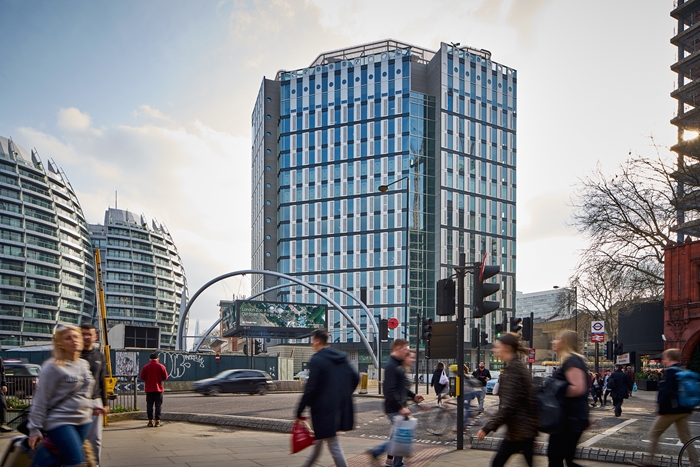White Collar Factory
by Allford Hall Monaghan Morris
Client Derwent London
Awards RIBA London Award 2018 and RIBA National Award 2018

The White Collar Factory is a new build reinvention of a refurbished office typology. The development followed the completion of an 8 year long research project by the architects and the client to investigate why refurbished Victorian industrial buildings often prove more popular to tenants than the modern day, new build equivalent.
The outcome is an exemplary development full of quality materials, finishes, details and playfulness; alongside public and community spirited generosity, innovation and experimentation (plus lots of lovely concrete).
The site strategy includes the creation of two new pedestrian streets through the site broadening into a little square with a few trees and walk on glass lights with views down to the unusual, cavernous basement below (a space that was deliberately created to be programme-less to allow for the opportunity of accidental occupation).
Six buildings are introduced on the site around the public space including the retention and refurbishment of 2 historically decent corner buildings that help embed the development into the existing context.
The buildings house a combination of offices, studios, incubator space, restaurants and apartments. The public permeability and integration of the scheme into the local narrow passage character should be commended.
The centre piece is the 16 storey block fronting Old Street roundabout that has the architect's trademark excellent handling of board marked concrete at its base.
Entering the public, double to treble height concrete space at pavement level, one would be forgiven for thinking you had entered a high end modern art gallery. The generous reception area, full of slack space leads you around to a raised public cafe up a few terraced steps encouraging people to perch and pause.
Following the results of the research project, the floor to ceilings are c500mm taller than standard (sacrificing the equivalent of 2-3 standard height floors within the massing), the office space is naturally ventilated with opening windows behind grills, the concrete provides thermal mass and carries the servicing, the public are encouraged into the ground floor space/cafe.
This overlaps the office life with the street life, and a Shoreditch-esque communal bar is located on the roof that every tenant gets free exclusive use of 3 times a year to help promote their business.
The expertly handled use of concrete as a finish continues upstairs with the stairwells and lift landing spaces feeling as considered and as special as the office space itself. Doors are held open in recesses to encourage the flow of people, energy and the acoustically baffled noise of busy-ness.
Every pair of floors have been considered together in the fire compartment strategy allowing for double height spaces between lift lobbies and corridors vertically breaking the traditional monotony of the typical horizontal commercial plan.
The ambition and level of innovation of the brief and concept development is high, and the confidence that the client had in trusting their own instincts and their architect's ideas (as opposed to agent's advice) should be highly commended. The success of the experimentation is evident in the client's decision to replicate many of the more surprising strategies in their new developments at planning stage.
Internal Area 27,220 m²
Contractor Multiplex
Structural Engineers AKT II
Environmental / M&E / Facade Engineers Arup
Quantity Surveyor / Cost Consultant AECOM
Project Management Jackson Coles
Access Consultant All Clear Designs
Landscape Architects BB UK Studio
Planning Tibbalds
Ecology Consultant Middlemarch Environmental
Agent Cushman & Wakefield, Pilcher Hershman and Colliers International
Sustainability Consultant ARUP















